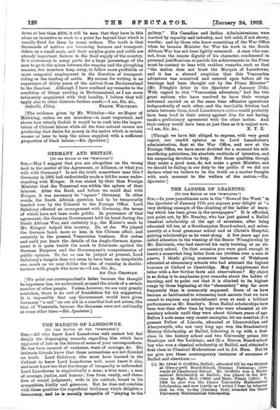GERMANY AND BRITAIN.
[To THE EDITOR OP THE "SPECTATOR."] Sra,—May I suggest that you are altogether on the wrong tack in the matter of the Agreement, or Alliance, or what you will, with Germany ? Is not the truth somewhere near this ? Germany in 1895 had undoubtedly made a bid for some under- standing with Kruger. It was stated by their then Foreign Minister that the Transvaal was within the sphere of their interest. After the Raid, and before we could deal with Kruger, it was necessary to " square" Germany. In other words, the South African question had to be temporarily handed over by the Colonial to the Foreign Office. Lord Salisbury effected an arrangement with Germany, the terms of which have not been made public. In pursuance of that agreement, the German Government held its hand during the South African War, and certainly (e.g., the Kaiser's snub to Mr. Kruger) helped this country. Do, ut des. We played the German hand, more or less, in the Chinese affair, and certainly in the present Venezuelan business. But unless and until you know the details of the Anglo-German Agree- ment it is quite beside the mark to fulminate against the German Emperor and the Government's comprehension of public opinion. So far as can be judged at present, Lord Salisbury's bargain does not seem to have been an inequitable one, much as we may dislike the idea of running in double- harness with people who hate us.—I am, Sir, &c., AN OLD °IONIAN.
[We print our correspondent's letter because the thought he expresses has, we understand, crossed the minds of a certain number of other people. Unless, however, we are very greatly mistaken, there is no sort of foundation for his suggestion. It is impossible that any Government would have given Germany " a call" on our aid in a case that had not arisen, like that of Venezuela, because the Germans were not unfriendly at some other time.—ED. Spectator.]






































 Previous page
Previous page